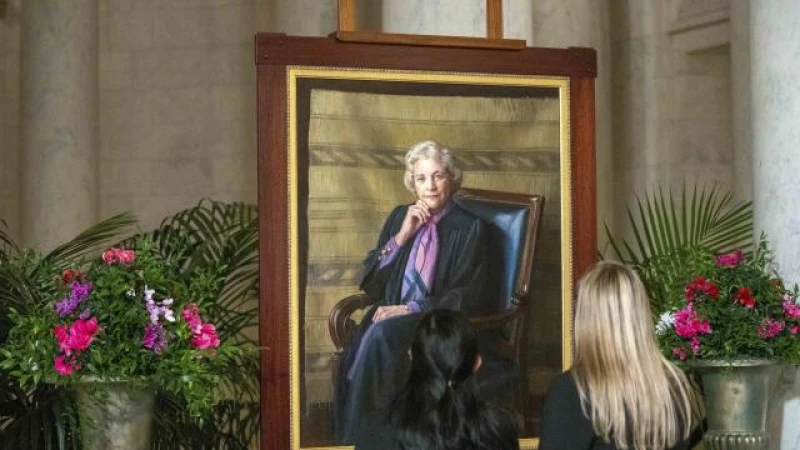Justice Sandra Day O'Connor Memorialized at National Cathedral
Washington — Justice Sandra Day O'Connor, the first woman to serve on the Supreme Court who served as its ideological center for more than two decades, is set to be memorialized Tuesday during a funeral service at the National Cathedral.
O'Connor died in Phoenix on Dec. 1 at the age of 93. The late justice is set to be eulogized by President Biden and Chief Justice John Roberts at the invitation-only gathering, which will be live-streamed.
The funeral service comes after Vice President Kamala Harris, the late justice's law clerks, members of Congress and the public paid respects to O'Connor as she lay in repose in the Supreme Court's Great Hall on Monday.
During a private ceremony at the court attended by all nine sitting justices and retired Justice Anthony Kennedy, Justice Sonia Sotomayor paid tribute to her "life role model" and praised O'Connor for serving as a "living example that women could take on any challenge, hold her own in spaces dominated by men and could do so with grace."
"The nation was well served by the steady hand and intellect of a justice who never lost sight of how the law affected ordinary people," Sotomayor said.
Supreme Court Justice Sandra Day O'Connor
Nominated to the Supreme Court by President Ronald Reagan and confirmed by the Senate unanimously, O'Connor was the first woman justice in the court's 191-year history. More than four decades after her historic confirmation, four women now sit on the Supreme Court.
She spent much of her 24-year tenure on the court at its center and was a crucial swing vote in divisive cases, notably on abortion. In 1991, O'Connor, with Kennedy and Justice David Souter, authored the majority opinion in a case that reaffirmed the right to abortion established in Roe v. Wade. In 2003, she wrote the majority opinion in a case allowing the narrowly tailored use of race in university admissions decisions.
More than 15 years after O'Connor left the Supreme Court, the court's conservative justices, who now hold a 6-3 majority, would go on to overturn Roe and end race-conscious admissions programs. The majority opinion unwinding the constitutional right to abortion was authored by Justice Samuel Alito, who replaced O'Connor on the high court.
Born in 1930, O'Connor grew up on her family's cattle ranch in southeastern Arizona, called the "Lazy B." She graduated third in her class at Stanford Law, two places behind her future Supreme Court colleague, Chief Justice William Rehnquist.
O'Connor met her husband, John Jay O'Connor, while in law school. He died in 2009 of complications from Alzheimer's disease.
Sandra Day O'Connor: A Trailblazer in Law and Education

Before making history as the first female Supreme Court Justice, Sandra Day O'Connor had already broken barriers in her home state of Arizona. She served in the Arizona State Senate and became the first woman to hold the position of majority leader in any state senate.
O'Connor's journey in the legal field began in 1974 when she was elected to the Maricopa County Superior Court. She later served as a judge on the Arizona Court of Appeals before being nominated to the Supreme Court by President Ronald Reagan in 1981.
During her tenure on the Supreme Court, O'Connor made significant contributions to American jurisprudence. She was known for her pragmatic approach and often served as a swing vote on key issues. O'Connor retired from the Court in 2006 to care for her husband, who was diagnosed with Alzheimer's disease.
After leaving the bench, O'Connor dedicated herself to promoting civics education. In 2009, she founded the organization iCivics, which provides educational resources and interactive games to help students learn about the Constitution and the democratic process.
O'Connor's contributions to society were recognized with numerous awards and honors. In 2009, President Barack Obama presented her with the Presidential Medal of Freedom, the highest civilian honor in the United States.
Sandra Day O'Connor passed away in [insert year] due to complications related to advanced dementia and a respiratory illness. Her legacy as a trailblazer in law and education will continue to inspire future generations.







